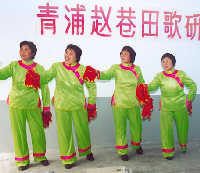
Just as "xintianyou" in Shannxi Province and "huaer" in Qinghai, Qingpu (Qingpu is now a district ofShanghai) field songs are primitive folk songs native to Shanghai. They have been listed as a key part of the city's national and folk culture protection project.
As the names indicate, Qingpu field songs are sung while people are laboring in the fields, such as plowing, transplanting rice seedlings, or weeding. Based on the Wuyue culture, the field songs fall into three types: traditional songs, improvisational and new folk songs. They have their own particular singing style, and are composed of eight parts. Usually loud and clear, the field songs have undulating melodies, with a difference of one octave between the high and the low tunes. Without normal rhythm, the songs are relatively flexible and sung at various speeds. .
In the heyday of the field songs, almost every family was able to sing one or two such songs, and there were even half-professional singers, known as singing masters among the locals. As small children, the masters learned to sing, and were able to improvise as well as to recite the lyrics of many long songs.
The ballads of Qingpu field songs can be as short as dozens of lines, or as long as thousands. In the busy farming season, two of three masters could often be seen standing in the field, singing to one another while beating a drum and striking a gong. This was meant to alleviate fatigue from labor. Most of the songs they sang told interesting stories or jokes. Sometimes they might order people about with their songs, to rest, eat, or move onn to another field. Apart from the antiphonal style, the masters might also sing together with working people.
After the liberation, the field songs began to be performed on the stage, and won many prizes in the national musical and dance performances. However, with the progress of urbanization and machinery replacing manual labor, field songs disappeared gradually. Nowadays, those capable of singing complete field songs are above 80 years old, and the youngest one has turned 64.
In the beginning of 2005, a base was founded for the protection of Shanghai's national and folk culture, and Qingpu field songs and Shanghaiguxiu(Gu Embroidery) were both recognized as a municipal-level protection project. Recently, the government of Qingpu district has allocated funds for the research and saving the songs.
First, a project will be launched to keep a record those field song artists still living in good health, with a view to building a database of the artists and songs.
Second, the environment will be protected through naming the villages or towns as "The Village/Town of Qingpu Field Songs," and the tradition of singing field songs will be revived in some area.
Finally, a field song a museum will be founded and a Field Songs Festival will be held at a fixed time.
